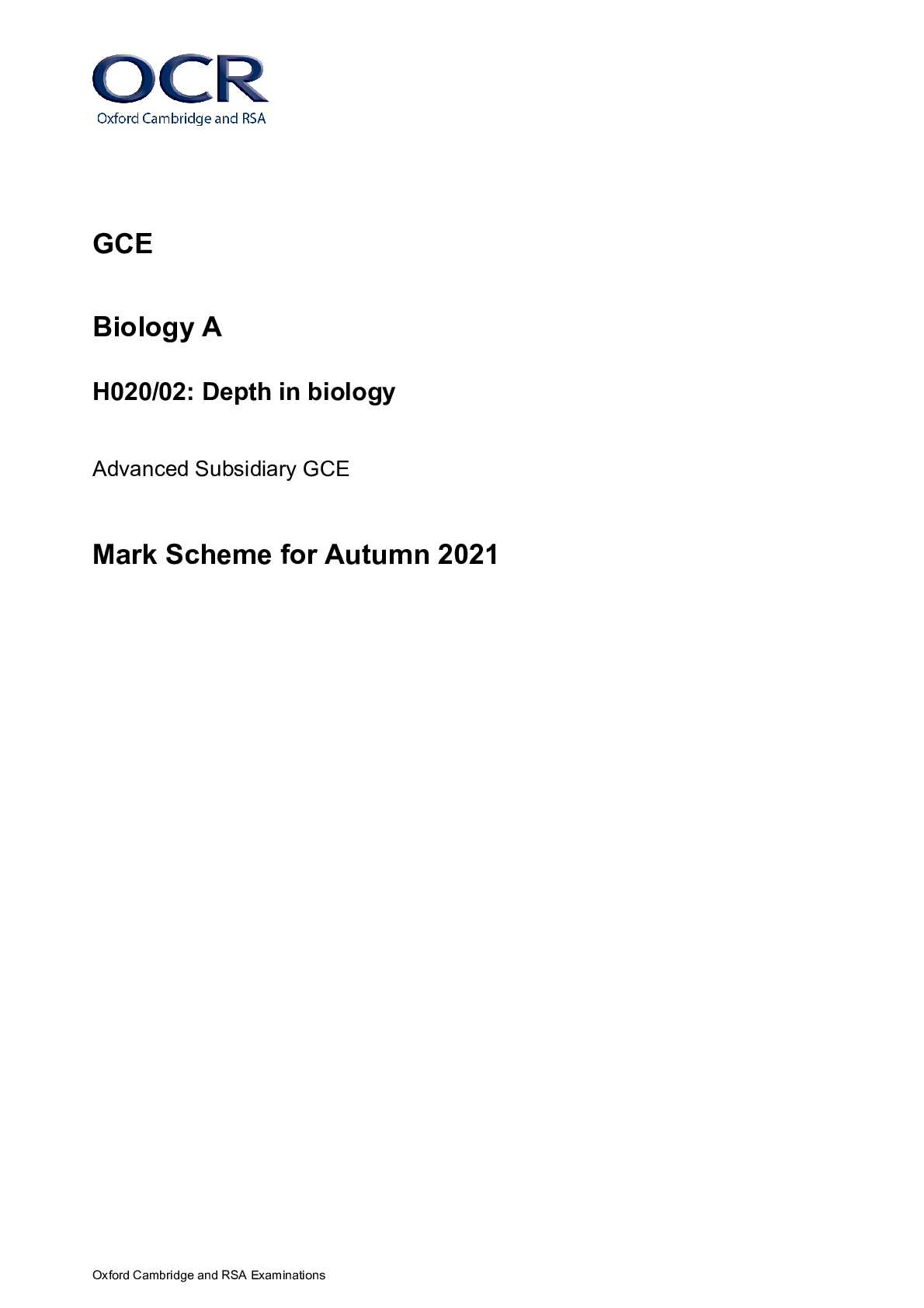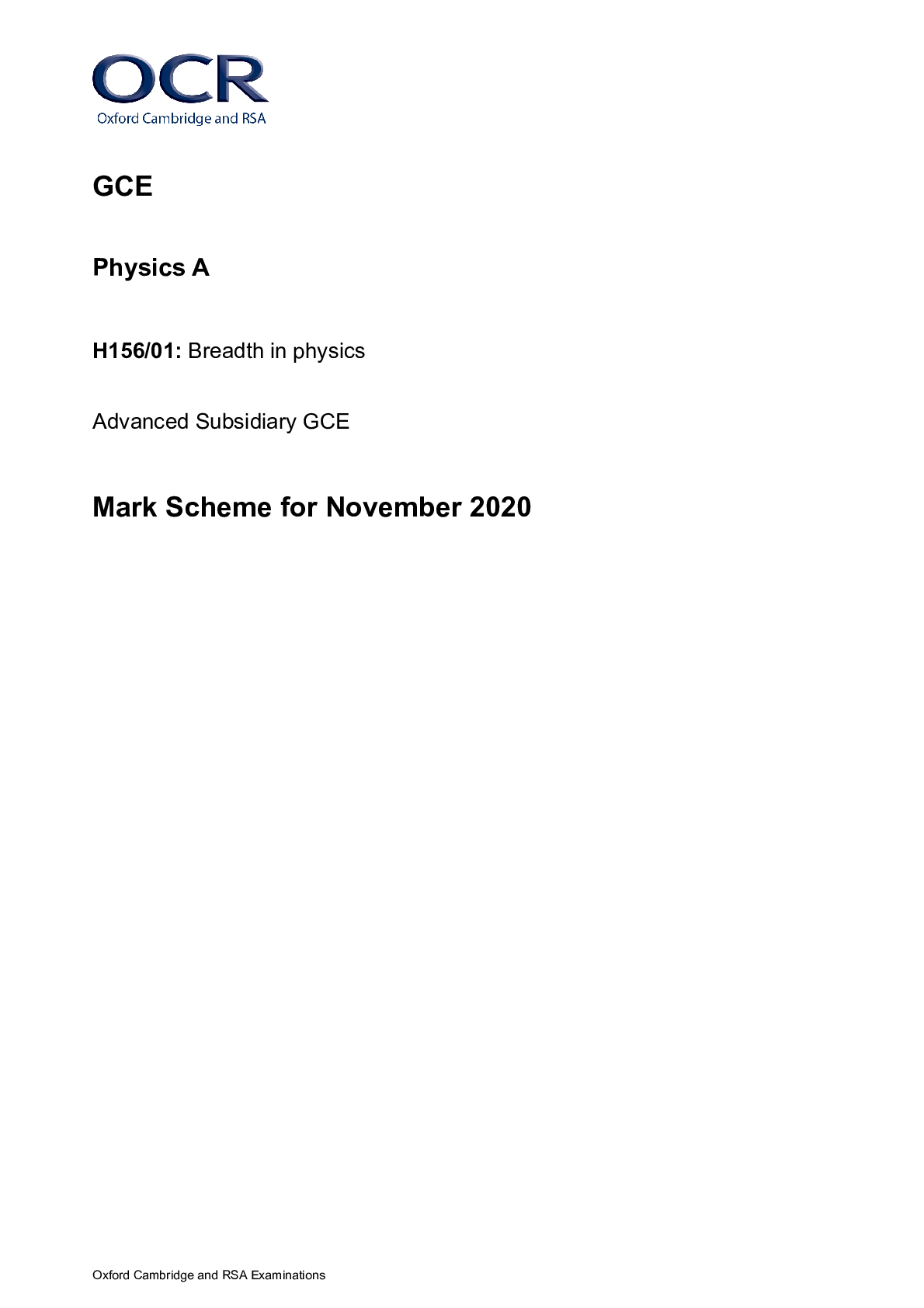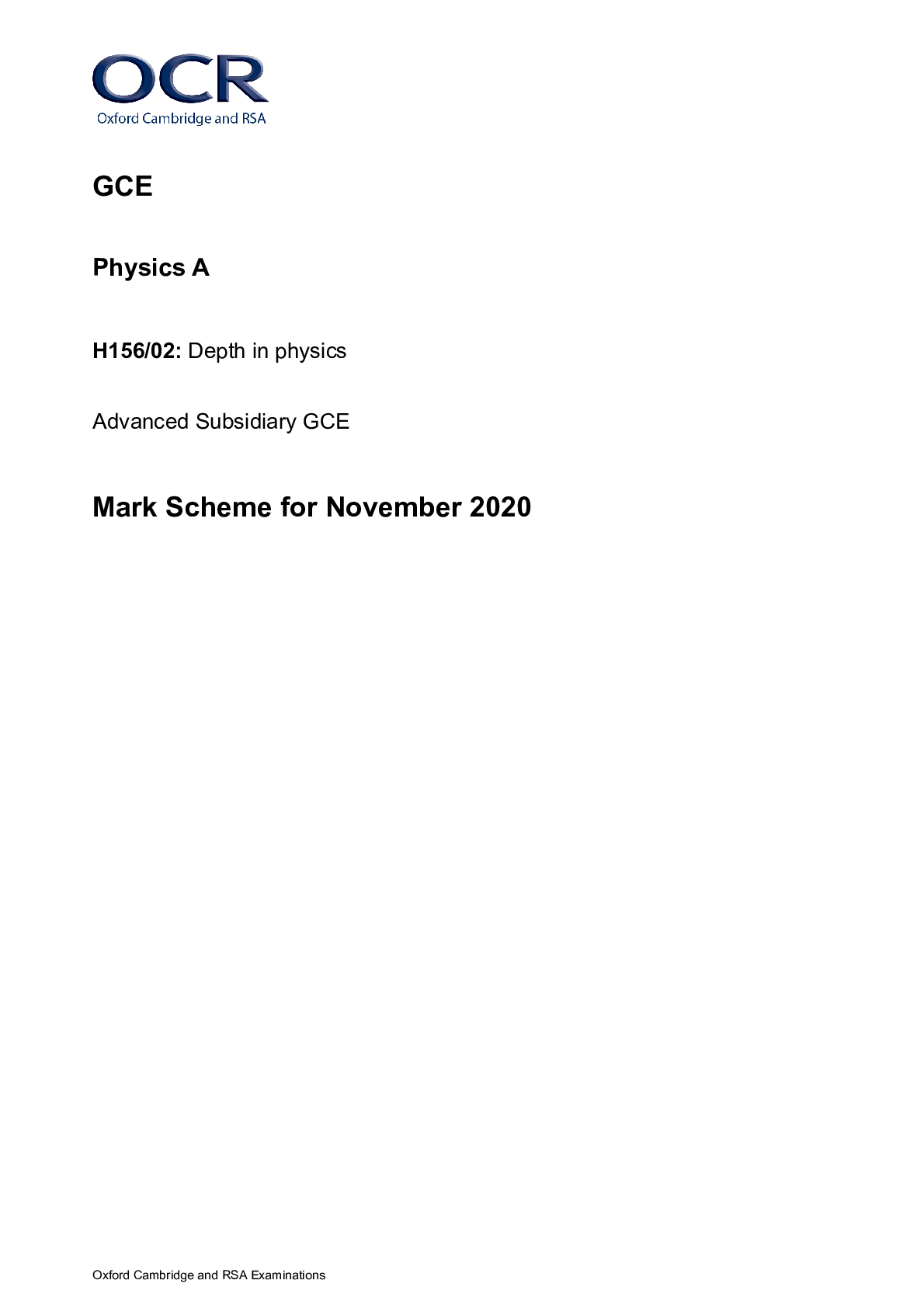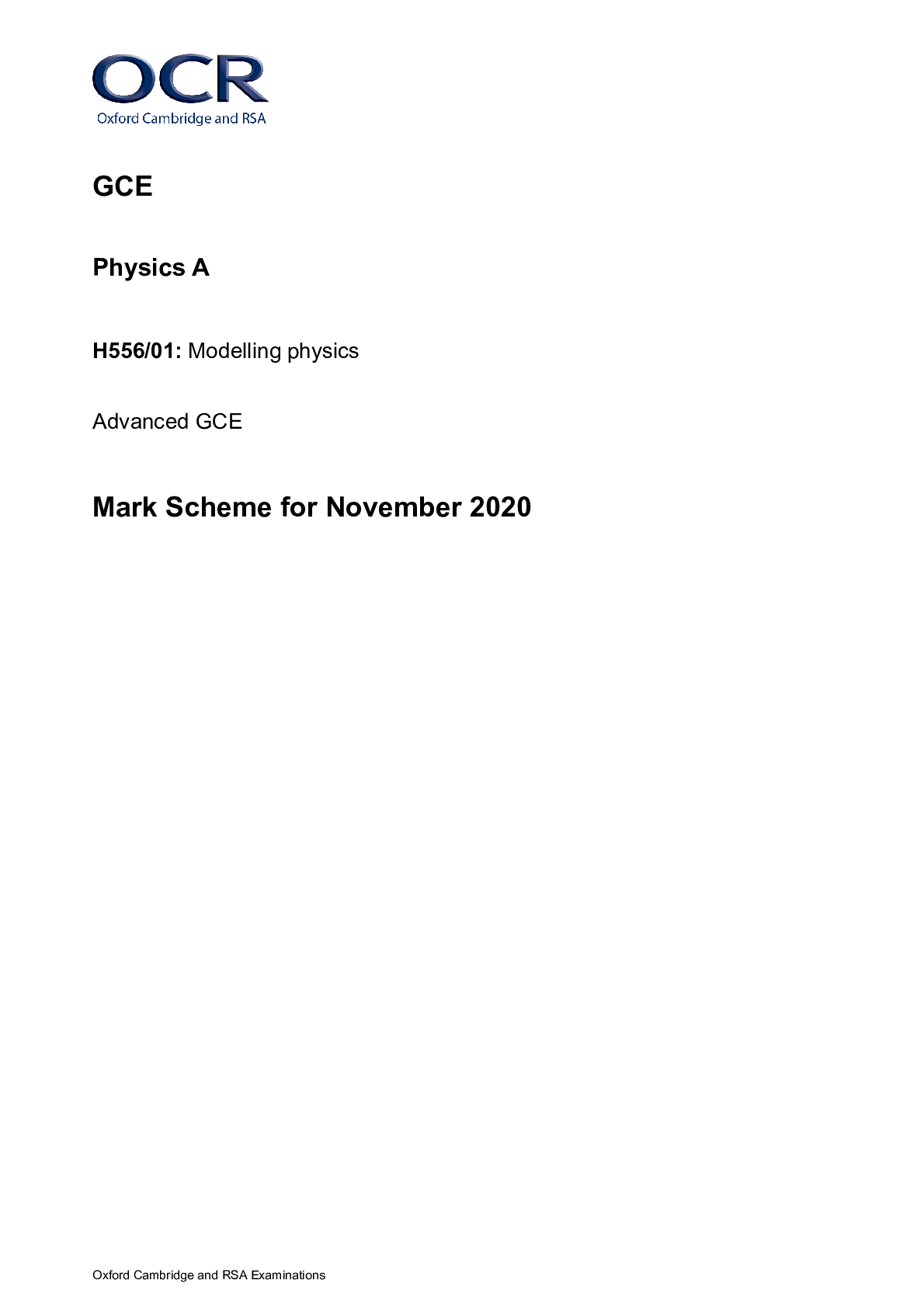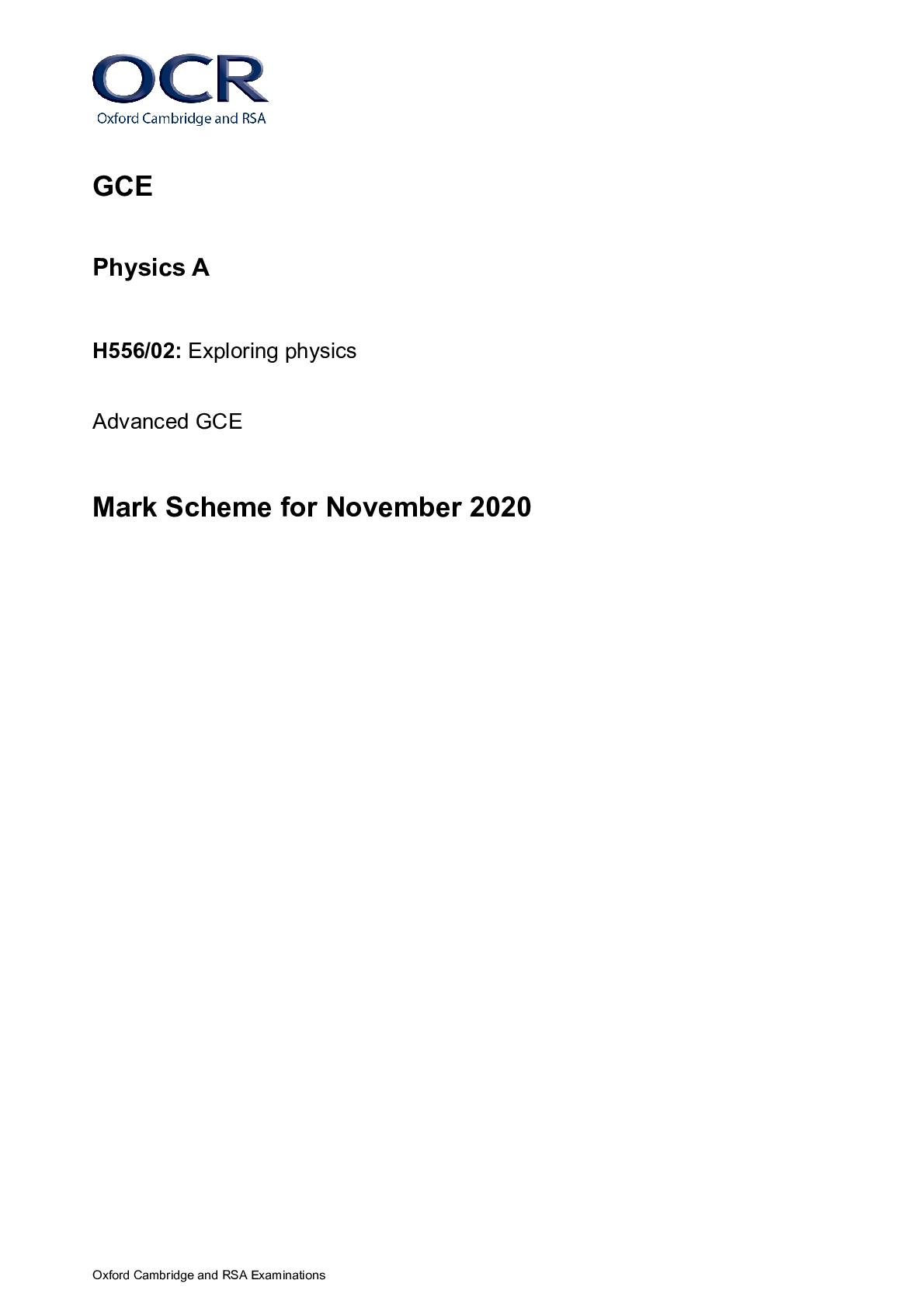Greek > AS Mark Scheme > GCE Classical Greek H444/01: Unseen translation Advanced GCE Mark Scheme for November 2020 (All)
GCE Classical Greek H444/01: Unseen translation Advanced GCE Mark Scheme for November 2020
Document Content and Description Below
Oxford Cambridge and RSA Examinations GCE Classical Greek H444/01: Unseen translation Advanced GCE Mark Scheme for November 2020Oxford Cambridge and RSA Examinations OCR (Oxford Cambridge and RS... A) is a leading UK awarding body, providing a wide range of qualifications to meet the needs of candidates of all ages and abilities. OCR qualifications include AS/A Levels, Diplomas, GCSEs, Cambridge Nationals, Cambridge Technicals, Functional Skills, Key Skills, Entry Level qualifications, NVQs and vocational qualifications in areas such as IT, business, languages, teaching/training, administration and secretarial skills. It is also responsible for developing new specifications to meet national requirements and the needs of students and teachers. OCR is a not-for-profit organisation; any surplus made is invested back into the establishment to help towards the development of qualifications and support, which keep pace with the changing needs of today’s society. This mark scheme is published as an aid to teachers and students, to indicate the requirements of the examination. It shows the basis on which marks were awarded by examiners. It does not indicate the details of the discussions which took place at an examiners’ meeting before marking commenced. All examiners are instructed that alternative correct answers and unexpected approaches in candidates’ scripts must be given marks that fairly reflect the relevant knowledge and skills demonstrated. Mark schemes should be read in conjunction with the published question papers and the report on the examination. © OCR 2020H444/01 Mark Scheme November 2020 Annotations Annotation Meaning Blank page: this annotation must be used on all blank pages within an answer booklet (structured or unstructured) and on each page of an additional object where there is no candidate response Noted but no credit given Specific improvement to be rewarded with a style mark (language); or creditable development of a point (literature) Division between sections of translation Unclear Benefit of doubt Repeated error; unpenalised; or consequential error resulting from a previous error; not to be re-penalised Major error, necessarily resulting in a reduced maximum mark for the section Incorrect: resulting in a reduced or no mark Not fully correct: possibly resulting in a reduced mark Omission, necessarily resulting in a reduced maximum mark for the section Point creditedH444/01 Mark Scheme November 2020 Subject Specific Marking Instructions Guidance on applying the marking grids for translating into English The general principle in assessing each section should be the proportion (out of 5) of sense achieved. One approach for each section is given. Acceptable alternatives will be illustrated during Standardisation, but examiners should assess on its own merits any approach that satisfactorily conveys the meaning of the Greek – the crucial consideration being the extent to which every Greek word is satisfactorily rendered in some way in the English. The determination of what a “slight” error is only necessary when it is the only error in a section; this distinction will then determine whether a mark of 5 or 4 is appropriate. Where marks of 4, 3, 2, 1 and 0 are applicable, the overall proportion of meaning conveyed in the section is the only consideration. The term “major” error has been used here to determine an error which is more serious than a “slight” error. The classification below should be seen only as a general guide, the intention of which is to maintain standards year-on-year. Lead markers should consider each instance on its own merits in the context of the passage and the section. It is likely that some of the errors below may be regarded as “major” if they appear in a relatively short and straightforward section, whereas in longer or more complex sections they are more likely to be a “slight” error. The sort of errors that we would generally expect to be considered as “slight” errors would be: • a single mistake in the translation of a verb, for example incorrect person or tense • vocabulary errors that do not substantially alter the meaning • omission of particles that does not substantially alter the meaning (although in certain cases the omission of a particle may not count as an error at all, most especially with μεν... δε) The sort of errors that we would generally expect to be considered as “major” errors would be: • more than one slight error in any one verb • vocabulary errors that substantially alter the meaning • omission of a word or words, including alteration of active to passive if the agent is not expressed • missed constructions • alteration in word order that affects the sense The final decisions on what constitutes a ‘slight’ and ‘major’ errors will be made and communicated to assessors via the standardisation process (after full consideration of candidates’ responses) and these decisions will be captured in the final mark scheme for examiners and centresH444/01 Mark Scheme November 2020 Marks Description 5 Accurate translation with one slight error allowed 4 Mostly correct 3 More than half right 2 Less than half right 1 Little recognisable relation to the meaning of the Greek 0 = No response or no response worthy of credit.H444/01 Mark Scheme November 2020 Section A: Unseen Prose Question Answer Mark Guidance The passage has been divided into 10 sections, each worth 5 marks. Award up to 5 marks per translated section according to the 5-mark marking grid found above. (i) οἱ δὲ ἄρχοντες ξυνεγίγνωσκον μὲν καὶ αὐτοὶ οὐχ ἧσσον ταῦτα ἐκείνου, καὶ ἐδόκει ποιητέα εἶναι, (But/and/now) the officials/authorities themselves also/too agreed about this/these things no less than he did, and thought that it/they ought to be done, 5 Accept positive (eg. ‘were firmly in agreement’) in lieu of double negative οὐχ ἧσσον, with idiomatic translation of genitive of comparison ἐκείνου. Slight errors: missing the force of καὶ αὐτοὶ; translating ἐδόκει as ‘he decided’ Major error: failure to recognise gerundive of obligation ποιητέα εἶναι (‘he seemed to be a poet’) (ii) τοὺς δὲ ἀνθρώπους ἄρτι ἀσμένους ἀπὸ ναυμαχίας τε μεγάλης ἀναπεπαυμένους, καὶ ἅμα ἑορτῆς οὔσης but (since) the people/men were happy, having recently taken a rest from the great sea-battle, and with there being a festival besides/at the same time, 5 accept “glad to have…” or any other appropriate recasting of the whole sentence here accept adverbial translation of ἀσμένους accept omission of τε slight error: “both… and” that does major error: missing genitive absolute / taking ἑορτῆς as dependent upon ἀπὸ (iii) (ἔτυχε γὰρ αὐτοῖς Ἡρακλεῖ ταύτην τὴν ἡμέραν θυσία οὖσα) οὐκ ἐνόμιζον ῥᾳδίως ἂν ἐθέλειν ὑπακοῦσαι, (for there happened to be for them/they happened to have a sacrifice to Hercules on/for this day) they did not think they would easily/readily want to obey, 5 major error: ἔτυχε translated as ‘met’ or with Heracles as its subjectH444/01 Mark Scheme November 2020 (iv) καὶ πάντα μᾶλλον ἤλπιζον ἂν πείθεσθαι αὐτοὺς ἢ ὅπλα λαβόντας ἐν τῷ παρόντι ἐξελθεῖν. and they expected that they would obey everything rather than take up arms and march out at the present moment. 5 expect a wide range of idiomatic translations of this section and consider the proportion of sense achieved for example, accept “…that they would (prefer to) obey any (other) order rather/other than…” major error: failure to co-ordinate λαβόντας and ἐξελθεῖν (v) ὡς δὲ τοῖς ἄρχουσι ταῦτα λογιζομένοις ἐφαίνετο ἄπορα, καὶ οὐκέτι ἔπειθεν αὐτοὺς ὁἙρμοκράτης, αὐτὸς τάδε μηχανᾶται, Since this/these proposals appeared on consideration impractical/unworkable to the officials, and Hermocrates was no longer persuading them, he devised the following himself, 5 accept any reasonable conjectures for λογιζομένοις and ἄπορα, including those taking ἄπορα as a noun slight error: aorist (rather than imperfect) translation of ἔπειθεν, but accept ‘could persuade’ (conative) slight error: omission of αὐτὸς (vi) φοβούμενος μὴ οἱ Ἀθηναῖοι προφθάσωσιν ἐν τῇ νυκτὶ διελθόντες τὰ χαλεπώτατα τῶν χωρίων· fearing that the Athenians might anticipate them in the night, having gone through the most difficult places. 5 accept (as usual) the switching of finite verbs and participles to make good English slight error: missing the prefix in διελθόντες slight error: missing the superlative force of χαλεπώτατα major error: failure to recognise fearing clause (eg. negative translation of μὴ) (vii) πέμπει τῶν ἑταίρων τινὰς τῶν ἑαυτοῦ μετὰ ἱππέων πρὸς τὸ τῶν Ἀθηναίων στρατόπεδον, ὅτε ξυνεσκόταζεν, he sent some friends of his own with some horsemen to the Athenian camp, when it was growing dark, 5 a short section: all errors will be major eg. taking τῶν ἑαυτοῦ syntactically with ἱππέωνH444/01 Mark Scheme November 2020 (viii) οἳ προσελάσαντες ἐξ ὅσου τις ἔμελλεν ἀκούσεσθαι, καὶ ἀνακαλεσάμενοί τινας, ὡς ὄντες τῶν Ἀθηναίων ἐπιτήδειοι, who rode up to (a place) from where someone was able/likely to hear (them), and having called out to some men, as though they were friends of the Athenians, 5 Accept idiomatic/loose translation of ἐξ ὅσου τις ἔμελλεν ἀκούσεσθαι eg. “within earshot” Major errors: taking ὄντες with the object (τινας); “since” for ὡς (ix) ἐκέλευον φράζειν Νικίᾳ μὴ ἀπάγειν τῆς νυκτὸς τὸ στράτευμα ὡς Συρακοσίων τὰς ὁδοὺς φυλασσόντων, told them to tell Nicias not to lead off his army during the night as the Syracusans were guarding the roads, 5 accept imperfective5 translation of ἐκέλευον slight error: missing the prefix in ἀπάγειν major errors: failure to recognise genitive time phrase (τῆς νυκτὸς); interpreting ὡς…φυλασσόντων as a purpose clause (x) ἀλλὰ καθ᾽ ἡσυχίαν τῆς ἡμέρας παρασκευασάμενον ἀποχωρεῖν. but to retreat quietly by day having made his preparations. 5 a short section: all errors will be major, but note: τῆς ἡμέρας: possible repeated error (with the time phrase) from (ix)H444/01 Mark Scheme November 2020 Section B: Verse Prose Question Answer Mark Guidance 2(a) The passage has been divided into 9 sections, each worth 5 marks. Award up to 5 marks per translated section according to the 5-mark marking grid found above. (i) σὺ δ᾽, ὦ τὸν αἰπὺν οὐρανὸν διφρηλατῶν Ἥλιε, (And) you, Helios, driving your chariot through the high heaven, 5 Very short section – all errors will be major. Allow any sensible conjecture for διφρηλατῶν eg. ‘travelling’, ‘speeding’, etc (ii) … πατρῴαν τὴν ἐμὴν ὅταν χθόνα ἴδῃς, ἐπισχὼν χρυσόνωτον ἡνίαν …when(ever) you see my native land, holding/restraining your reins studded with gold, 5 Accept any reasonable translation of χρυσόνωτον that indicates that Helios’ reins contain gold / gleam Major error: not recognising that ἐπισχὼν is a participle (nb accept ‘hold… and announce’) (iii) ἄγγειλον ἄτας τὰς ἐμὰς μόρον τ᾽ ἐμὸν γέροντι πατρὶ τῇ τε δυστήνῳ τροφῷ. announce my ruin(s) and my fate to my aged father and to the unhappy one who reared me. 5 Major error: failing to recognise that ἄγγειλον is an Aorist imperative Accept μόρον as either ‘fate’ or ‘death’ Major error: τροφῷ must refer to Ajax’s mother, not a nurse / nanny; candidates are given a clue to this in the introductionH444/01 Mark Scheme November 2020 (iv) ἦ που τάλαινα, τήνδ᾽ ὅταν κλύῃ φάτιν, ἥσει μέγαν κωκυτὸν ἐν πάσῃ πόλει. I imagine, when the poor woman hears this news she will raise a great wailing through the whole city. 5 Slight error: not translating ἦ που which in this context is not associated with place, but is instead used to qualify an expression (‘perhaps’, ‘indeed’, ‘I suppose’ etc) Major error: confusing κλύῃ (hears) with something more related to renown or fame ἥσει: from ἵημι: accept any reasonable translation of this phrase indicating his mother’s public lamentation (v) ἀλλ᾽ οὐδὲν ἔργον ταῦτα θρηνεῖσθαι μάτην, ἀλλ᾽ ἀρκτέον τὸ πρᾶγμα σὺν τάχει τινί. But there is no point to lamenting these things in vain, (whereas) the deed must be begun with some speed. 5 Allow omission of the second ἀλλ᾽ which introduces Ajax’s alternative to pointless lamentation but is difficult to render into fluent English Slight error: ‘matter’/‘affair’ or other translation of πρᾶγμα that does not adequately reflect the physical/active nature of suicide Major error: failure to recognise that ἀρκτέον is the gerundive of ἀρχομαι, denoting obligation (vi) ὦ φέγγος, ὦ γῆς ἱερὸν οἰκείας πέδον Σαλαμῖνος, ὦ πατρῷον ἑστίας βάθρον O daylight, O sacred plain of my own land Salamis, O ancestral foundation of my hearth 5 Major error: failure to recognise which nouns agree with which adjectives in the phrase γῆς ἱερὸν οἰκείας πέδον or only identifying one of the nouns in the periphrasis of γῆς … πέδον Slight error: omission of the vocatives ὦ Accept any reasonable rendition of οἰκείας: associations with Ajax himself (‘my own’) or with his own home or family. Simply ‘the homely land’ is a major error.H444/01 Mark Scheme November 2020 (vii) κλειναί τ᾽ Ἀθῆναι καὶ τὸ σύντροφον γένος κρῆναί τε ποταμοί θ᾽ οἵδε, and renowned Athens and the race I was brought up with, and these springs and rivers, 5 Very short section – all errors will be major, including the translation of Ἀθῆναι as ‘Athenians’ Slight error: omission of the τ᾽… καὶ … τε … θ᾽… before the final καὶ (line 13) σύντροφον: accept translations that indicate the kinship between the Athenians and the Salaminians; nonrendering of σύν- is a major error. Accept any reasonable sense of rearing, nurturing, nourishing or sustaining for τροφῆς (viii) ...καὶ τὰ Τρωϊκὰ πεδία προσαυδῶ, χαίρετ᾽, ὦ τροφῆς ἐμοί: and the Trojan plains - I address you: farewell, you who reared me: 5 Accept ‘greetings' (ix) τοῦθ᾽ ὑμὶν Αἴας τοὔπος ὕστατον θροεῖ, τὰ δ᾽ ἄλλ᾽ ἐν Ἅιδου τοῖς κάτω μυθήσομαι this is the last word that Ajax utters to you – the rest/others I will speak to those below in Hades. 5 Major error: omission of τοῖς Major error: incorrect tense for μυθήσομαι Slight error: “I will speak below to those in Hades”H444/01 Mark Scheme November 2020 2(b) ἄγγειλον ἄτας τὰς ἐμὰς μόρον τ᾽ ἐμὸν – – v – – – v – v – v – γέροντι πατρὶ τῇ τε δυστήνῳ τροφῷ. v – v – v – v – – – v – Accept an anceps on the final syllable of each line. 5 Content: Two lines give 6 metra; each correct metron should be ticked and the number of ticks converted to a mark out of 5, as below. Metron divisions should be ignored. This means that credit should be given for four adjacent syllables correctly marked, if they make up a correct metron, even if the candidate has split them into separate metra. Levels of response: Marks Description 5 6 feet correct 4 5 feet correct 3 4 feet correct 2 3 feet correct 1 1 or 2 feet correct 0 None correctOCR (Oxford Cambridge and RSA Examinations) The Triangle Building Shaftesbury Road Cambridge CB2 8EA [Show More]
Last updated: 1 year ago
Preview 1 out of 13 pages
Instant download
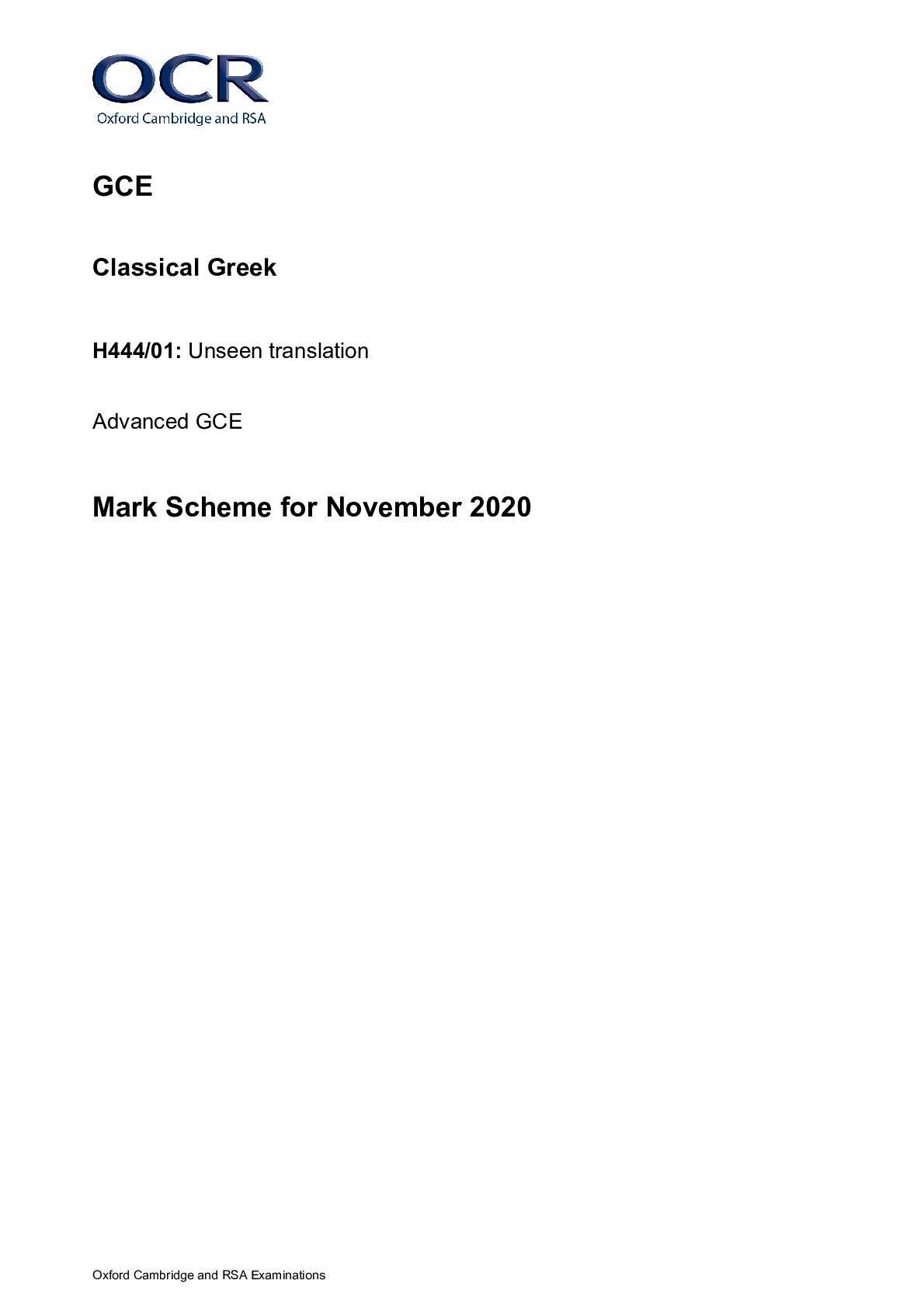
Buy this document to get the full access instantly
Instant Download Access after purchase
Add to cartInstant download
Reviews( 0 )
Document information
Connected school, study & course
About the document
Uploaded On
Oct 10, 2022
Number of pages
13
Written in
Additional information
This document has been written for:
Uploaded
Oct 10, 2022
Downloads
0
Views
52

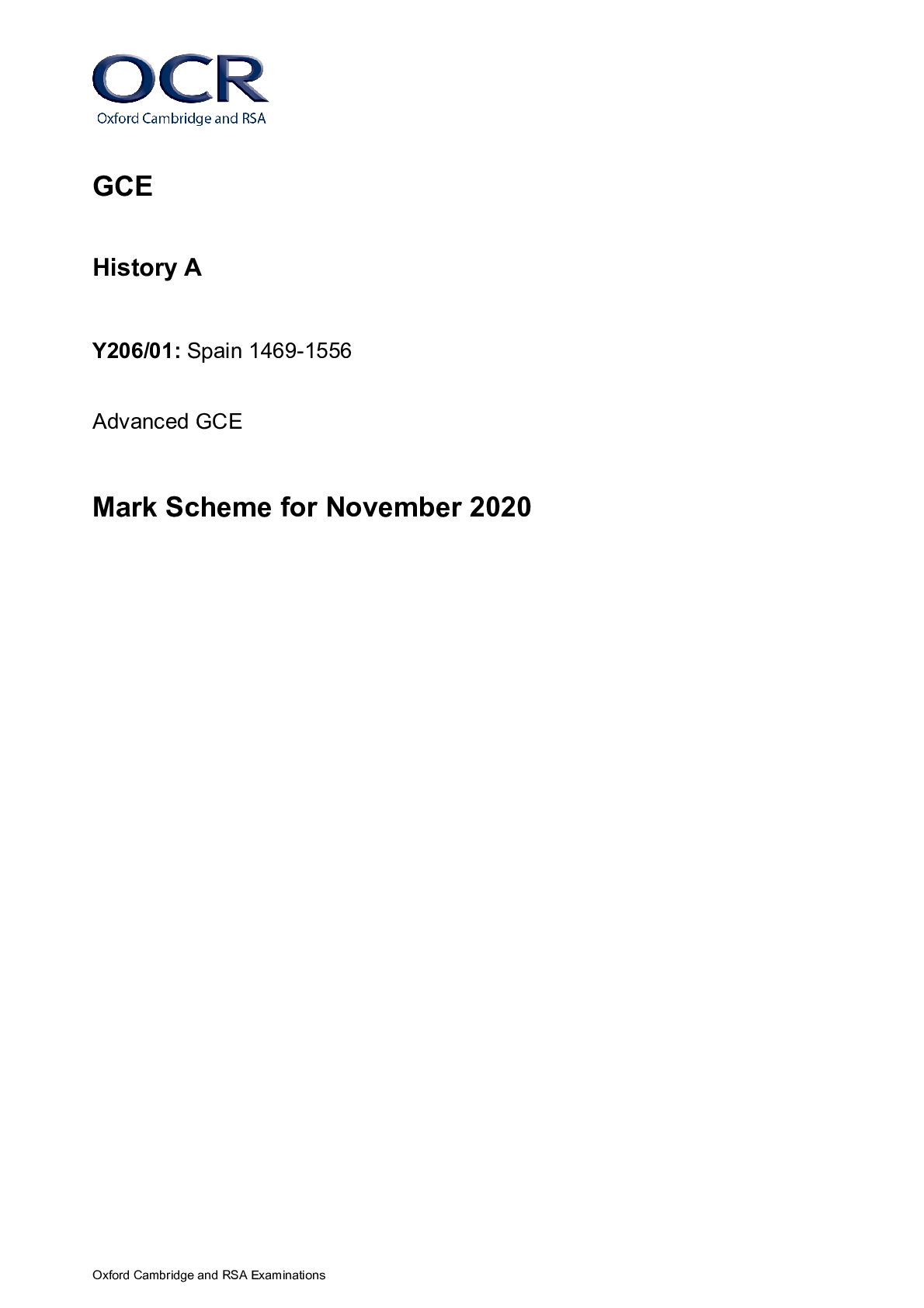
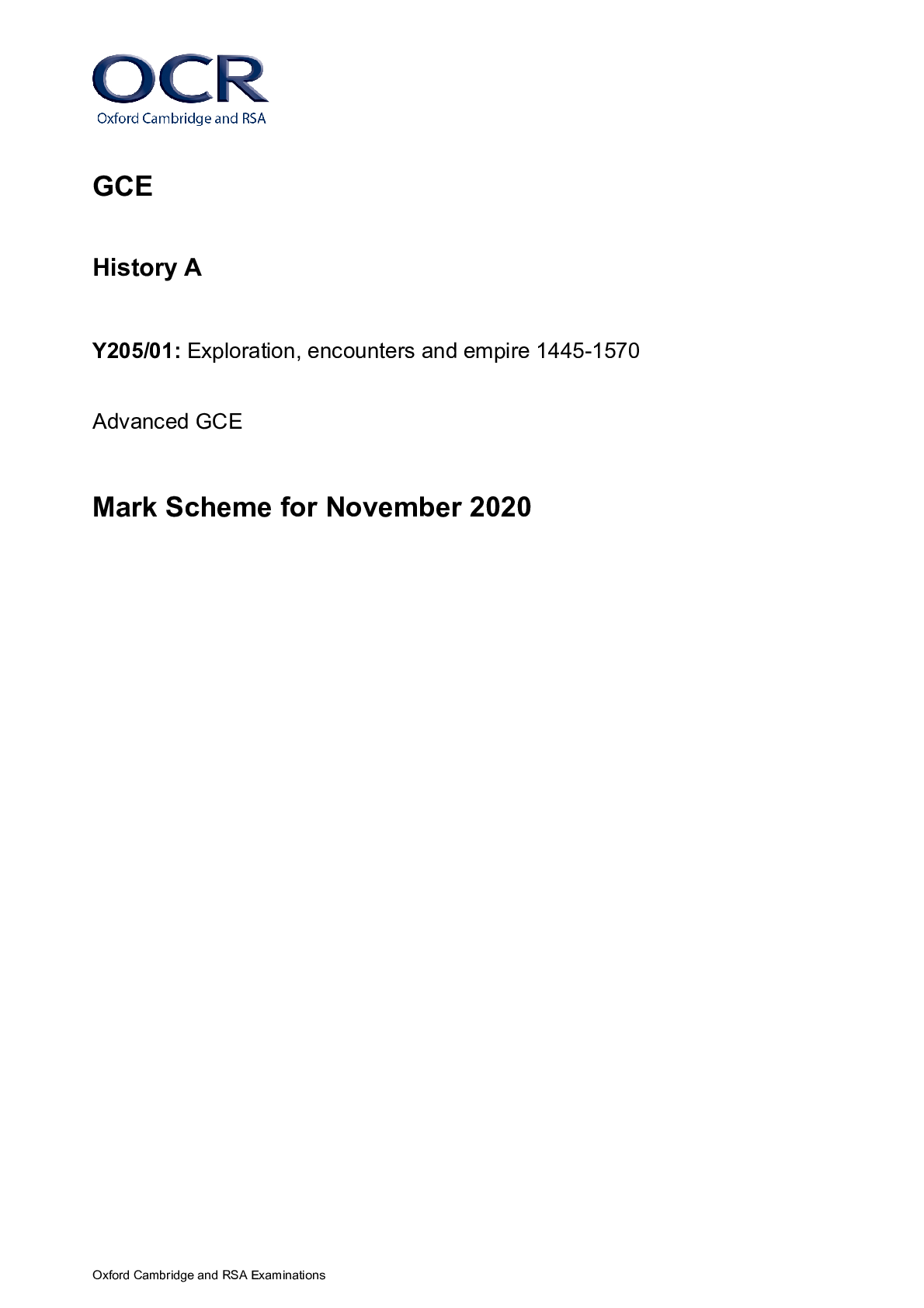
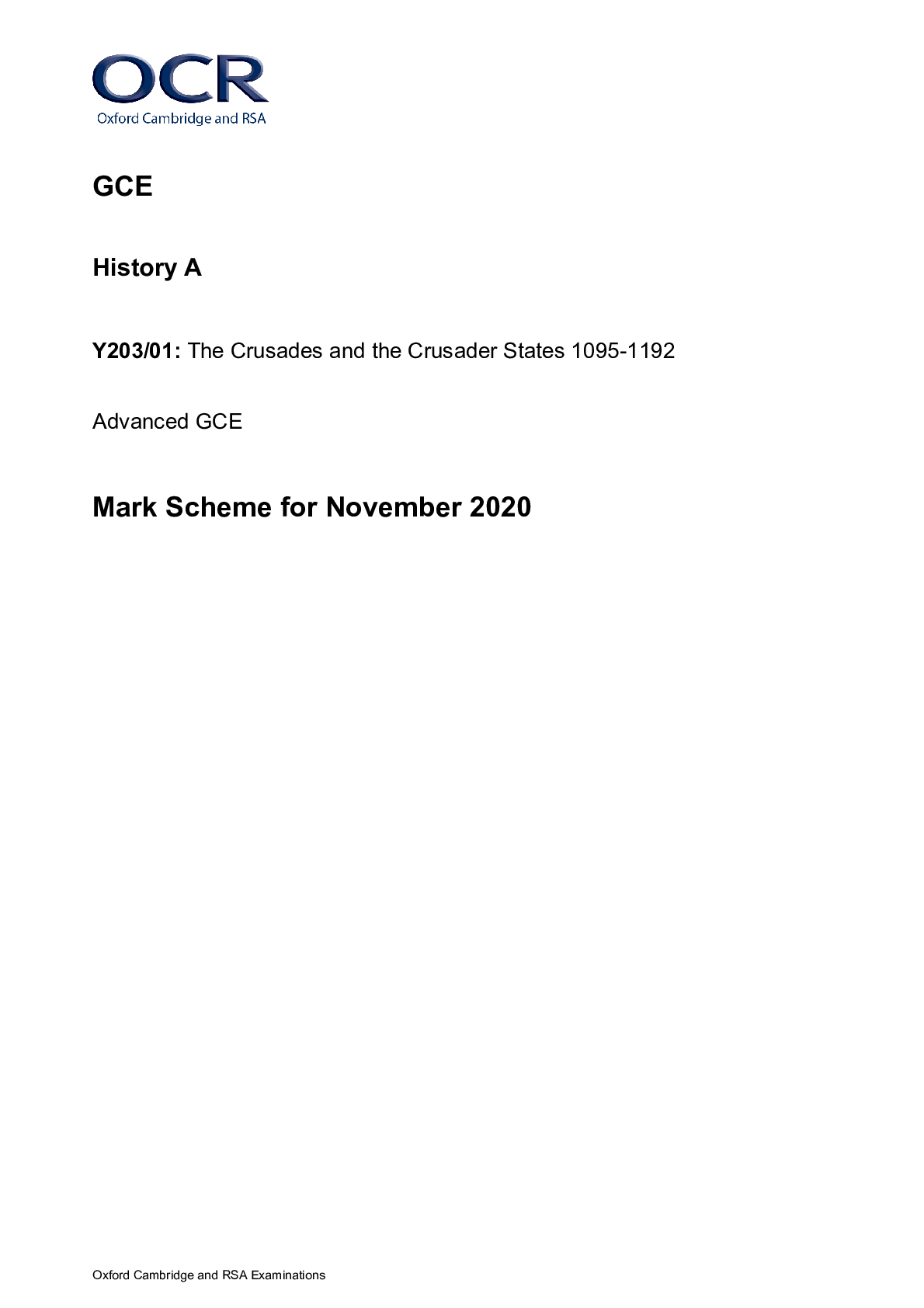
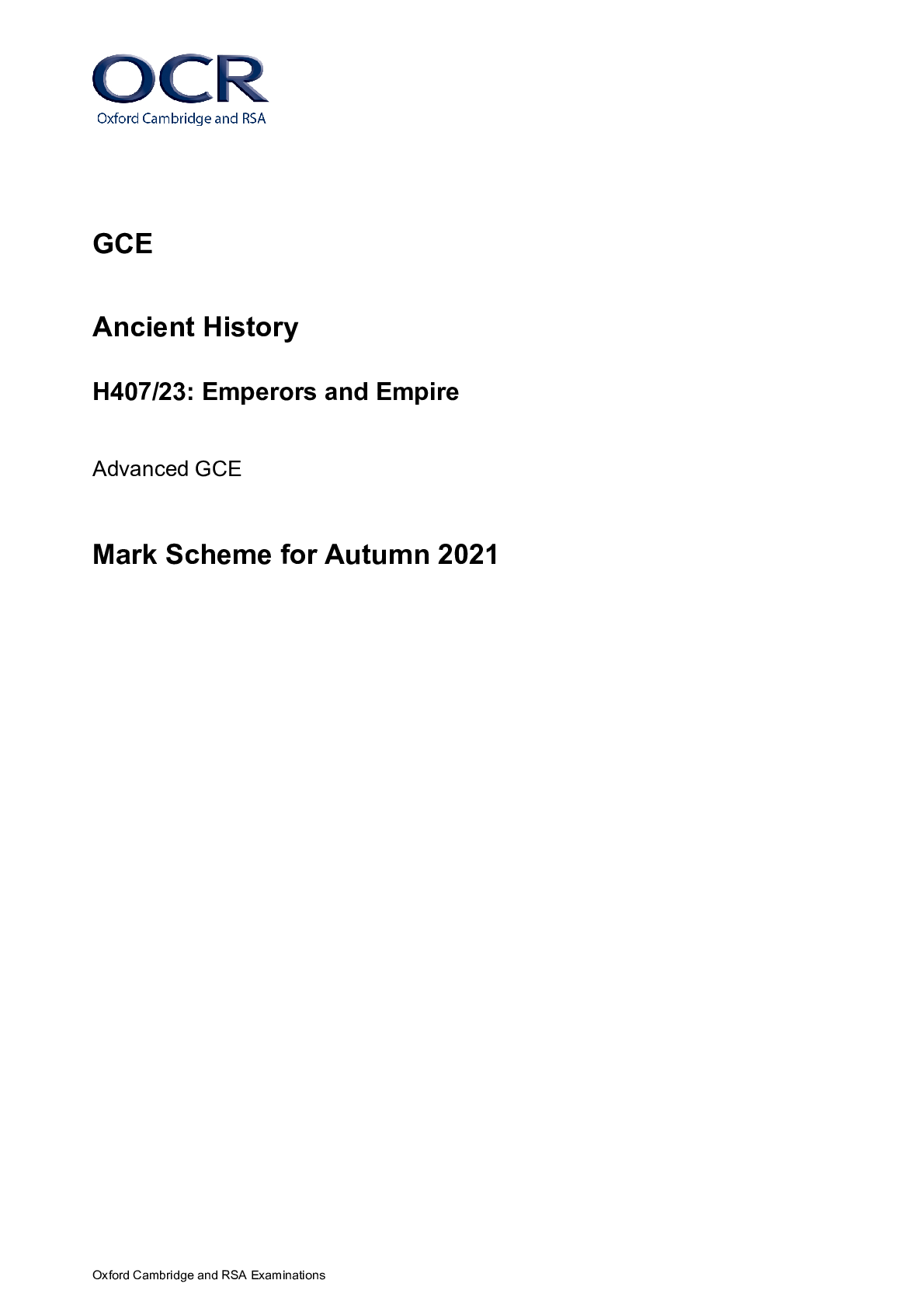

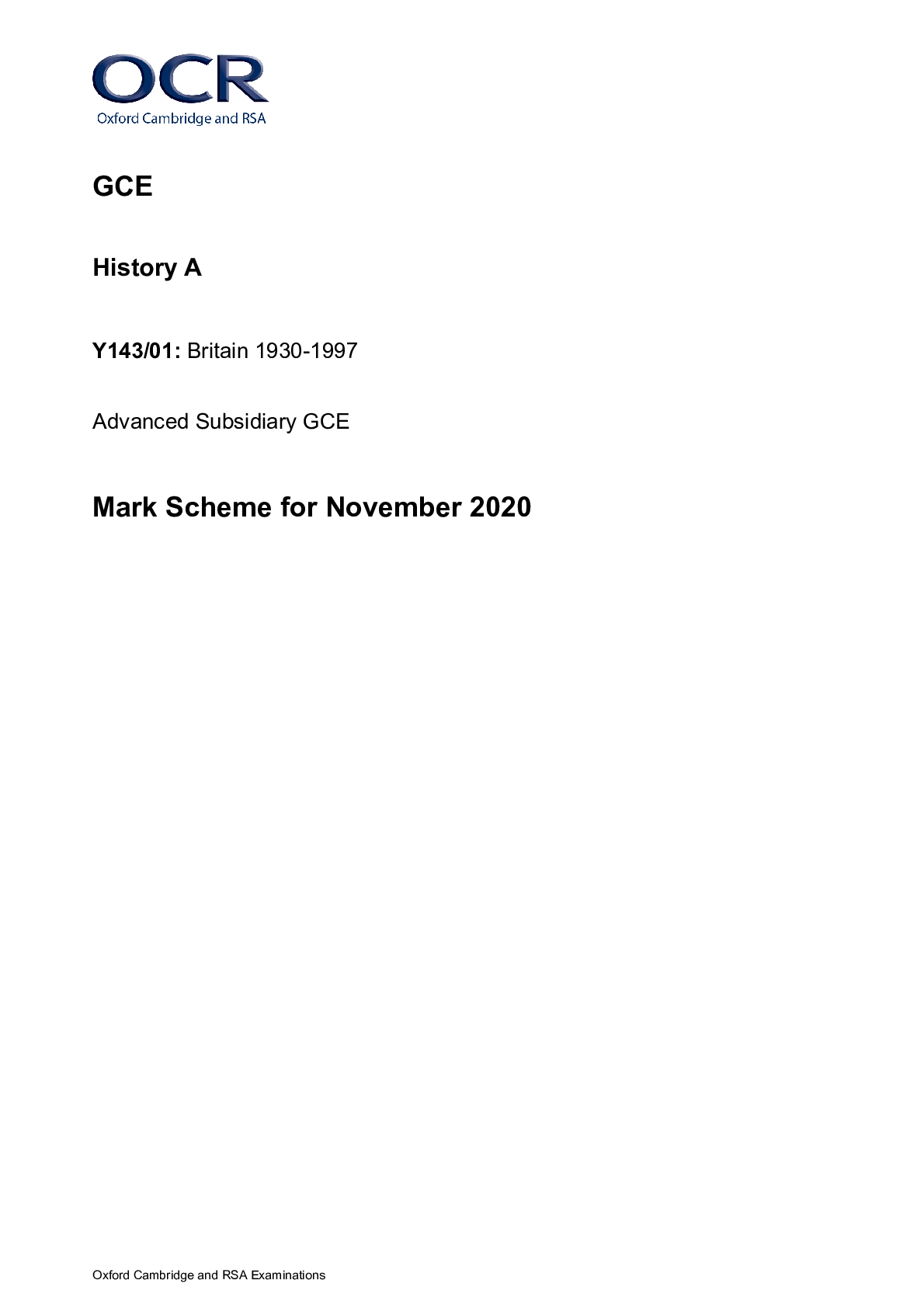
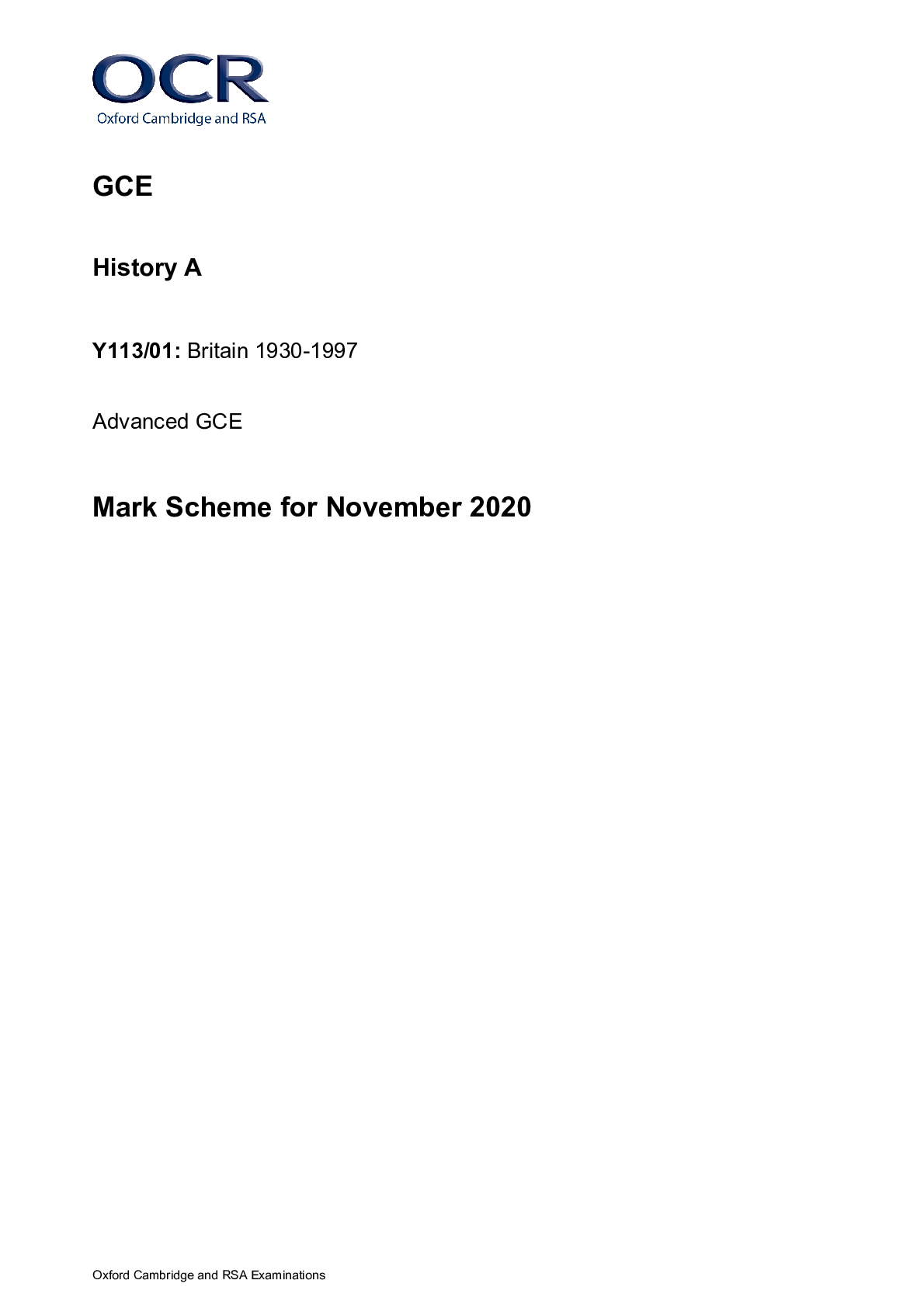
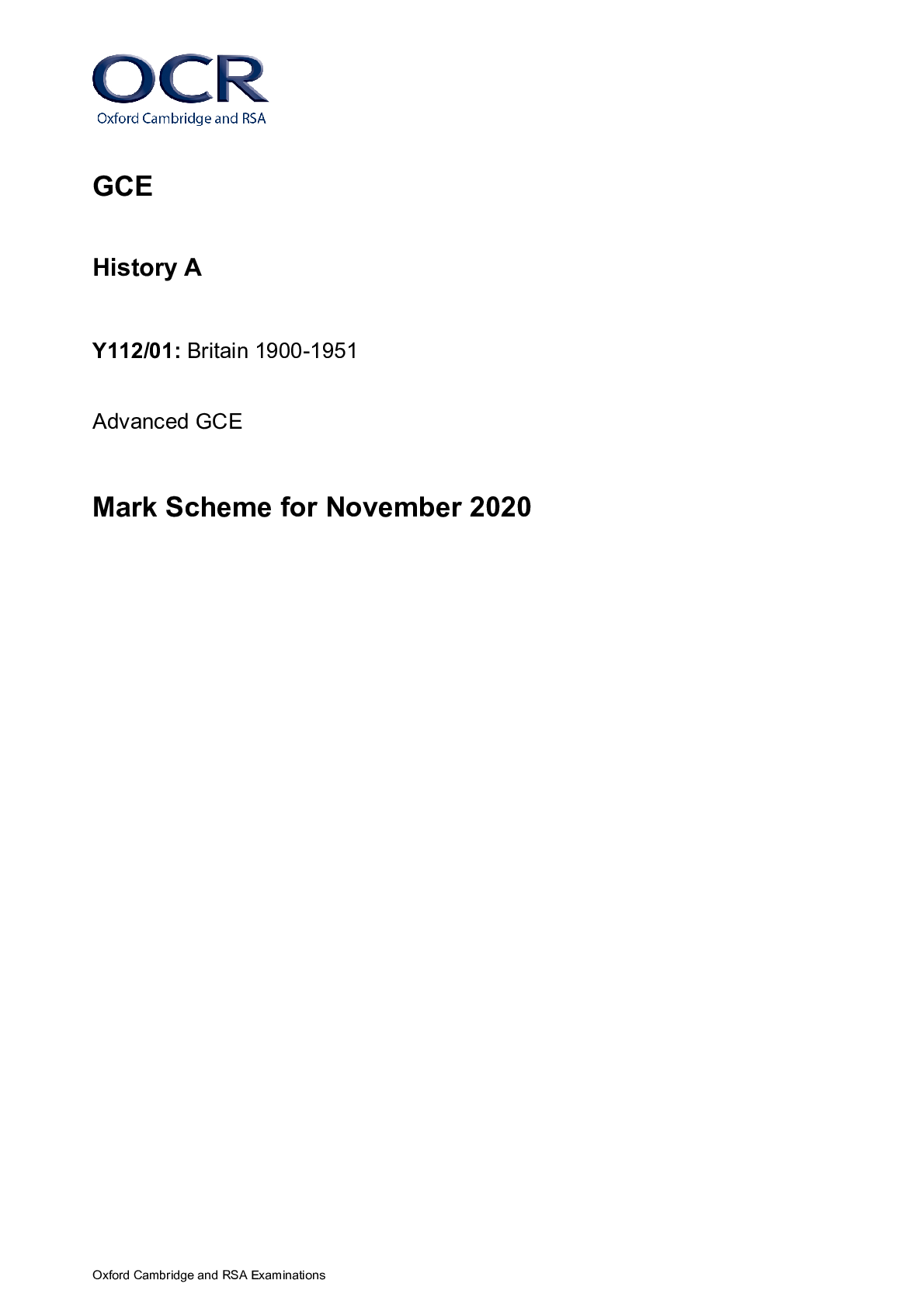
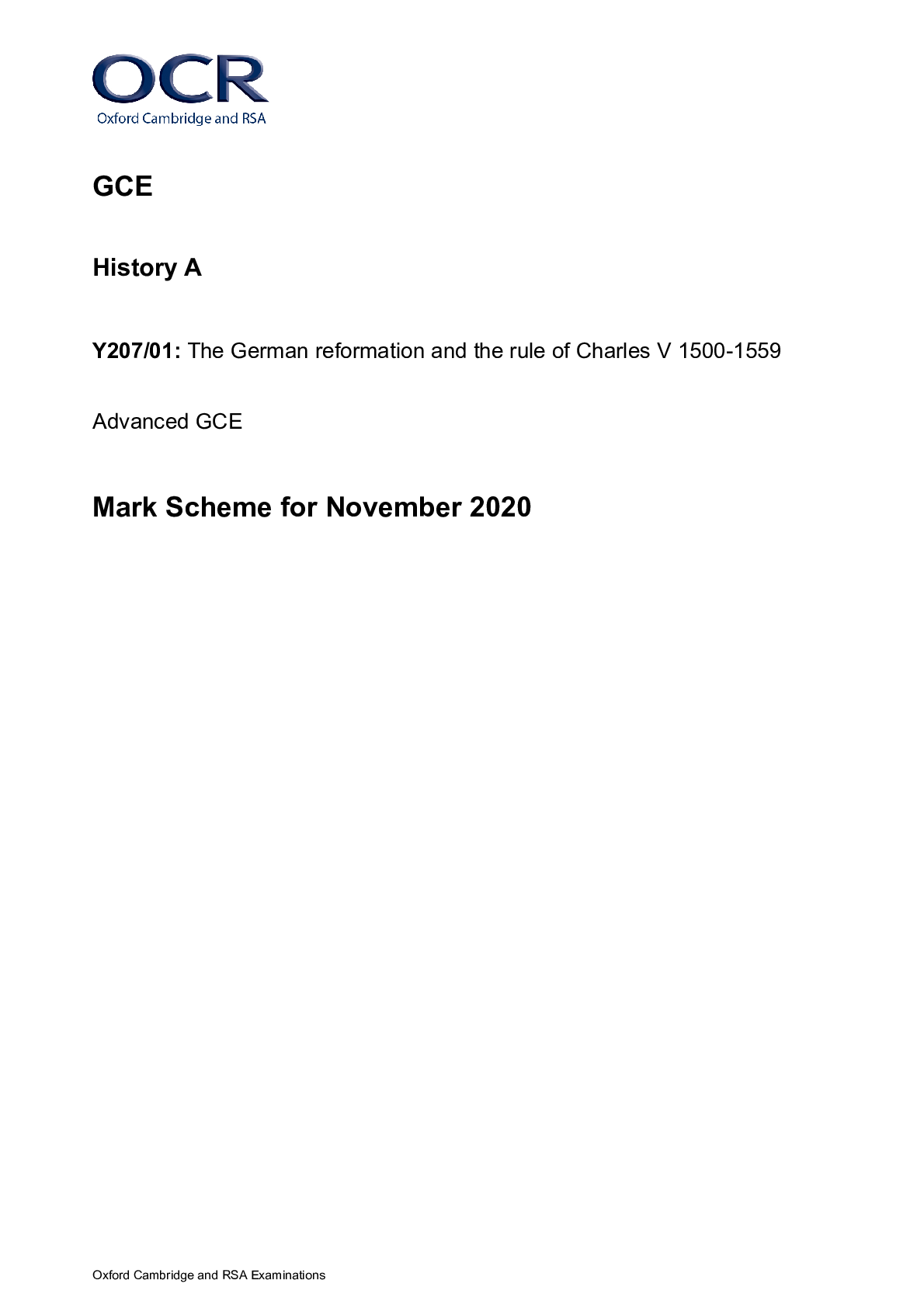

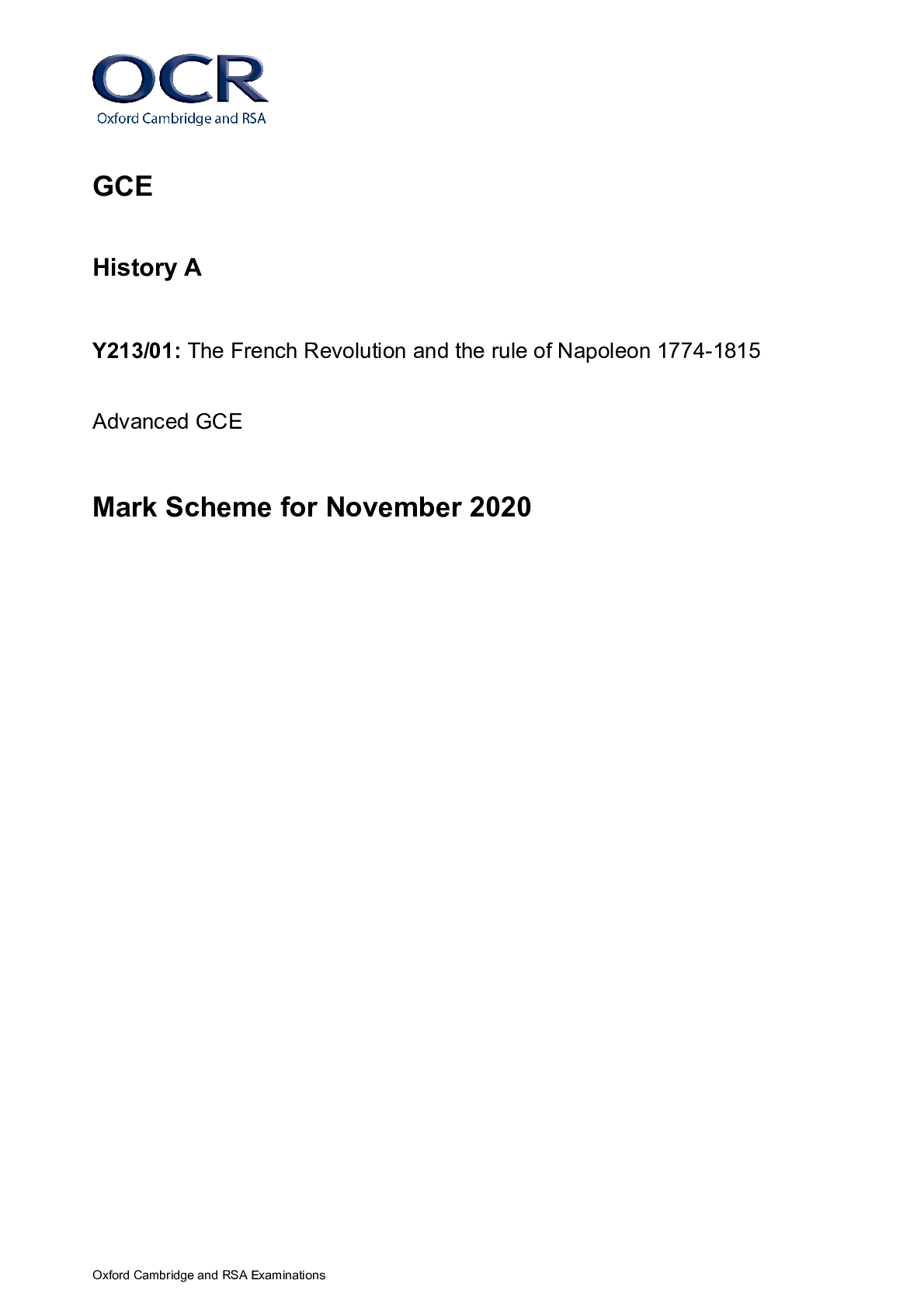

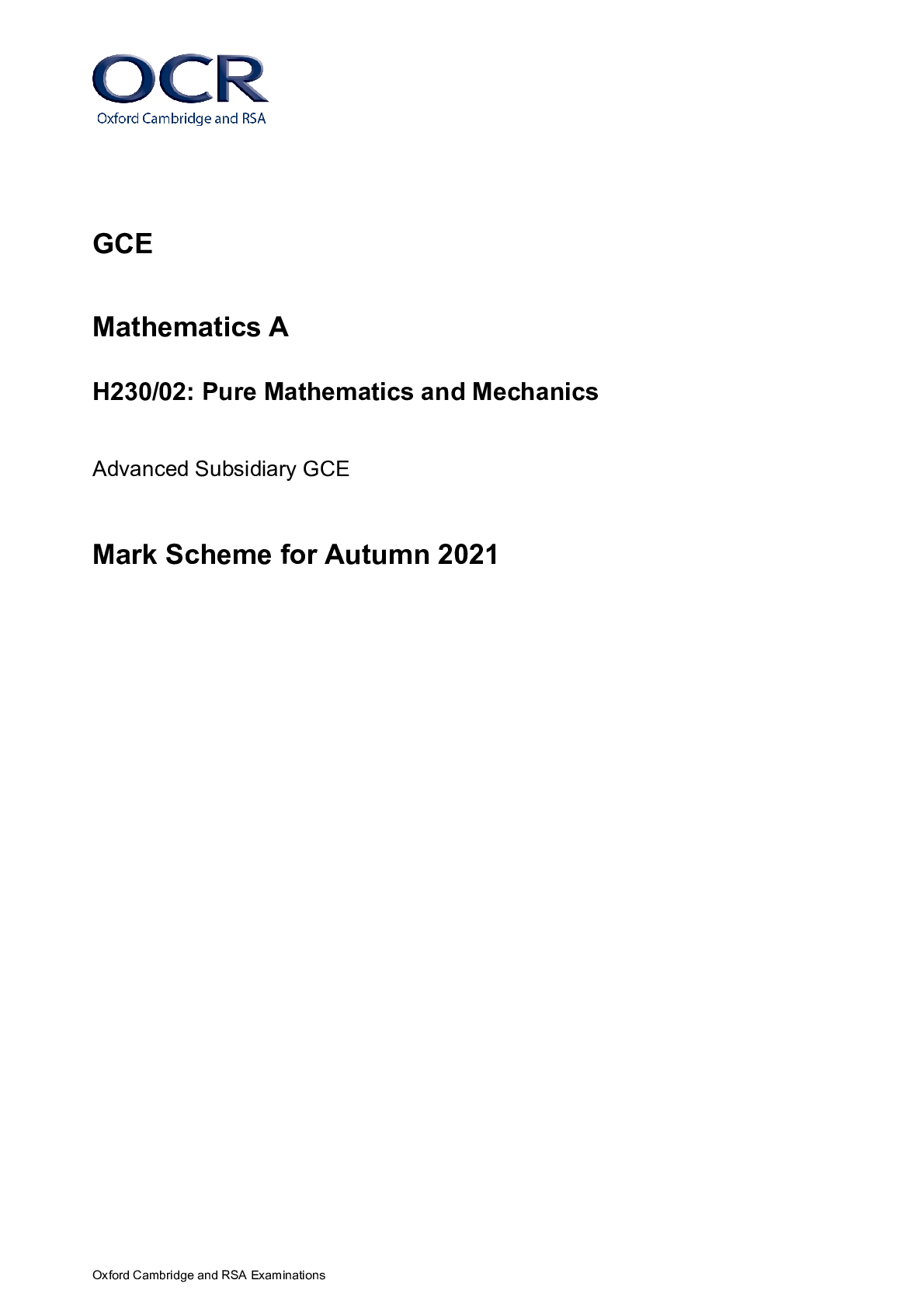


.png)
